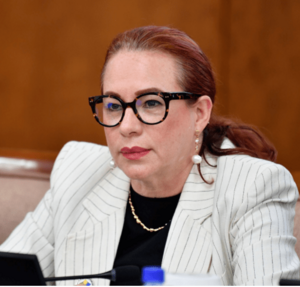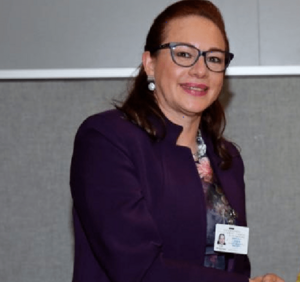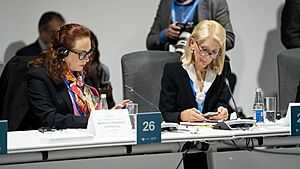María Fernanda Espinosa facts for kids
Quick facts for kids
María Fernanda Espinosa
|
|
|---|---|

Espinosa in 2024
|
|
| President of the 73rd UN General Assembly | |
| In office 18 September 2018 – 17 September 2019 |
|
| Preceded by | Miroslav Lajčák |
| Succeeded by | Tijjani Muhammad-Bande |
| Minister of Foreign Affairs | |
| In office 24 May 2017 – 11 June 2018 |
|
| President | Lenín Moreno |
| Preceded by | Guillaume Long |
| Succeeded by | José Valencia Amores |
| In office 15 January 2007 – 7 December 2007 |
|
| President | Rafael Correa |
| Preceded by | Francisco Carrión |
| Succeeded by | María Isabel Salvador |
| Minister of National Defense | |
| In office 28 November 2012 – 23 September 2014 |
|
| President | Rafael Correa |
| Preceded by | Miguel Carvajal |
| Succeeded by | Fernando Cordero Cueva |
| Coordinating Minister of Heritage | |
| In office 19 October 2009 – 28 November 2012 |
|
| President | Rafael Correa |
| Preceded by | Alex Rivas |
| Succeeded by | María Belén Moncayo |
| Personal details | |
| Born | 7 September 1964 Salamanca, Spain |
| Spouse | Eduardo Mangas |
| Alma mater | Facultad Latinoamericana de Ciencias Sociales Pontificia Universidad Católica del Ecuador Rutgers University |
María Fernanda Espinosa Garcés (born September 7, 1964) is an important person from Ecuador. She is a linguist (someone who studies language), a poet, a politician, and a diplomat. A diplomat represents their country in other nations.
Currently, she leads an organization called GWL Voices. This group works to make sure men and women have equal chances in international organizations. Before this, she advised on nature and indigenous peoples for the International Union for Conservation of Nature (IUCN). She also led their work in South America.
María Fernanda Espinosa was Ecuador's Minister of Foreign Affairs two times. This role is like being the chief diplomat for a country. She also served as Ecuador's ambassador to the United Nations in New York and Geneva. From 2012 to 2014, she was Ecuador's Minister of National Defense.
In June 2018, she made history. She was chosen to be the President of the United Nations General Assembly. This means she led meetings for all the countries in the UN. She was the fourth woman ever to hold this important job in the UN's 73-year history. Besides her political work, she also writes poems and essays.
Contents
Education and Early Career
María Fernanda Espinosa started her studies at a French-Ecuadorian school in Quito. She finished high school there in 1982. Later, she studied Linguistics at the Pontifical Catholic University of Ecuador. She earned her first degree in 1988.
She continued her studies in Anthropology and Political Science in Quito. In 1993, she earned a Master’s Degree in Social Sciences. Her master's research focused on protecting nature in the Amazon region of Ecuador.
From 1994 to 1996, María Fernanda studied Geography at Rutgers University in the United States. She also worked as a researcher at the Latin American Faculty of Social Sciences (FLACSO). There, she started a program to study how society and the environment interact. Her work focused on the Amazon rainforest, how to develop things without harming the environment, and climate change.
From 1999 to 2005, Espinosa advised on topics like biodiversity (the variety of life), climate change, and the rights of indigenous peoples. She then became the Regional Director for South America at the International Union for Conservation of Nature (IUCN). This organization works to protect nature. She held this job from 2005 to 2007 before starting her political career. She also won a national poetry prize in Ecuador in 1990.
Political Leadership in Ecuador
María Fernanda Espinosa began her career helping indigenous communities in the Amazon rainforest. She worked to protect these important forests. Her early work involved working with groups that help people and with universities. This led her to advise on biodiversity and climate change policy.
From 1989 to 1990, she worked for the Natura Foundation of Ecuador. She helped connect nature protection with how local people make a living. In 1994, she worked for UNICEF in Niger. She helped create projects to teach about the environment. She also advised the United Nations on forests and the rights of indigenous people.
Espinosa led the Socio-Environmental Studies Program at FLACSO from 1996 to 1999. This showed her strong leadership in environmental issues. From 1999 to 2005, she advised the International Union for Conservation of Nature (IUCN). She took part in international talks about nature, genetic resources, and traditional knowledge.
In 2005, she became the Regional Director for South America at IUCN. She helped governments plan for sustainable development. Her work focused on how protecting nature can help reduce poverty. She also helped countries in South America work together on environmental strategies. She played a key role in major international meetings on biodiversity and climate change.
Her early career always focused on linking nature protection with sustainable development. She also worked to empower indigenous communities. This work prepared her for her later roles in government and international diplomacy.
Serving Under President Rafael Correa
Under President Rafael Correa, María Fernanda Espinosa held many important jobs in the Ecuadorian government.
- Minister of Foreign Affairs (2007): She was in charge of Ecuador's relationships with other countries. She helped create a new foreign policy for Ecuador. She also worked to improve cooperation between Ecuador and Peru.
- Advisor to the Constituent Assembly (2007-2008): She helped write Ecuador's 2008 Constitution. She focused on the rights of nature, indigenous peoples, and international affairs.
- Ambassador to the United Nations in New York (2008-2009): She was Ecuador's top representative at the UN. She helped lead discussions on how to improve the UN General Assembly. She also helped with talks about the 2008 financial crisis. She worked on environmental issues and helped create UN Women.
- Minister of Natural and Cultural Heritage (2009-2012): She was in charge of protecting Ecuador's natural and cultural treasures. She led the Yasuní-ITT Initiative. This project aimed to prevent CO2 emissions by leaving oil in the ground in exchange for international support. She also worked on a national plan against racism.
- Minister of National Defense (2012-2014): She was the third woman to lead Ecuador's armed forces. She made changes to military education, training, and health policies. She also created a policy for gender equality within the armed forces. She worked to modernize the military to deal with new threats like cybercrime.
- Ambassador to the United Nations in Geneva (2014-2017): She represented Ecuador at the UN and other international groups in Geneva. She led a group working on rules for large companies and human rights. She also defended Ecuador's decision to give political asylum to Julian Assange. She played a big role in international talks on sustainable development and climate change. She led the position of 34 Latin American and Caribbean countries in these talks.
Serving Under President Lenín Moreno
On May 24, 2017, María Fernanda Espinosa became the Minister of Foreign Affairs again. This time, she served under President Lenín Moreno.
Leading the United Nations General Assembly
On June 5, 2018, Espinosa was elected as the President of the United Nations General Assembly. She was the fourth woman to hold this position and the first woman from Latin America and the Caribbean.
She won with 128 votes from the 193 UN member states. She ran against Mary Elizabeth Flores from Honduras.
During her time as President, she brought together women leaders. They worked to encourage more women to get involved in politics. She also led important events on women's empowerment. She helped pass the United Nations Declaration on the Rights of Peasants in November 2018. She also helped with the Global Compact on Refugees and the Global Compact for Safe, Orderly and Regular Migration in December 2018.
In February 2019, Espinosa launched the International Year of Indigenous Languages. She also led a big event on culture and sustainable development in May 2019. As President, she started a worldwide campaign against single-use plastics. She successfully removed single-use plastics from the UN headquarters in New York and Geneva.
After Her UN Presidency
In 2020, Espinosa was nominated to be the secretary-general of the Organization of American States. She ran against Luis Almagro but did not win.
Before her political and diplomatic career, Espinosa was a professor and researcher at FLACSO. She also advised on biodiversity, climate change, and indigenous peoples’ policies. She was the regional director for South America of the International Union for Conservation of Nature (IUCN).
Other Important Activities
María Fernanda Espinosa is involved in many other important groups and activities:
- She is on the Board of Trustees for the International Crisis Group (ICG).
- She is a member of International Gender Champions (IGC).
- She is a member of the World Future Council.
- She is a Fellow of the World Academy of Art and Science.
- She is a Commissioner for the Lancet COVID-19 Commission.
- She is on the High-Level Advisory Council for the United Nations Alliance of Civilizations, UNAOC.
- She is a founding member of the Centre for UN Studies at the University of Buckingham.
- She is the Executive Director and a member of GWL Voices.
- She is a Goodwill Ambassador for the Latin American and Caribbean Fund for the Development of the Indigenous Peoples, FILAC. She is also a Goodwill Ambassador for the Common Home of Humanity.
Awards and Honors
María Fernanda Espinosa has received several awards for her work:
- In January 2020, she received the 2020 Sundance Film Festival Women’s Leadership Celebration award.
- In 2019, she received the Rehabilitation International Award for Outstanding Achievements in innovation. This was for her work in helping people with disabilities around the world.
- In 2019, she was named one of the 100 Women BBC. This list includes 100 inspiring and influential women from around the world.
- On September 24, 2014, she received the Atahualpa Medal for Merit, Gran Cruz (Grand Cross) class, from the Armed Forces of Ecuador.
- On February 23, 2007, she received The Orden “El Sol del Perú” (The Order of the Sun of Peru), Gran Cruz (Grand Cross) class.
See also
 In Spanish: María Fernanda Espinosa para niños
In Spanish: María Fernanda Espinosa para niños
 | Precious Adams |
 | Lauren Anderson |
 | Janet Collins |



